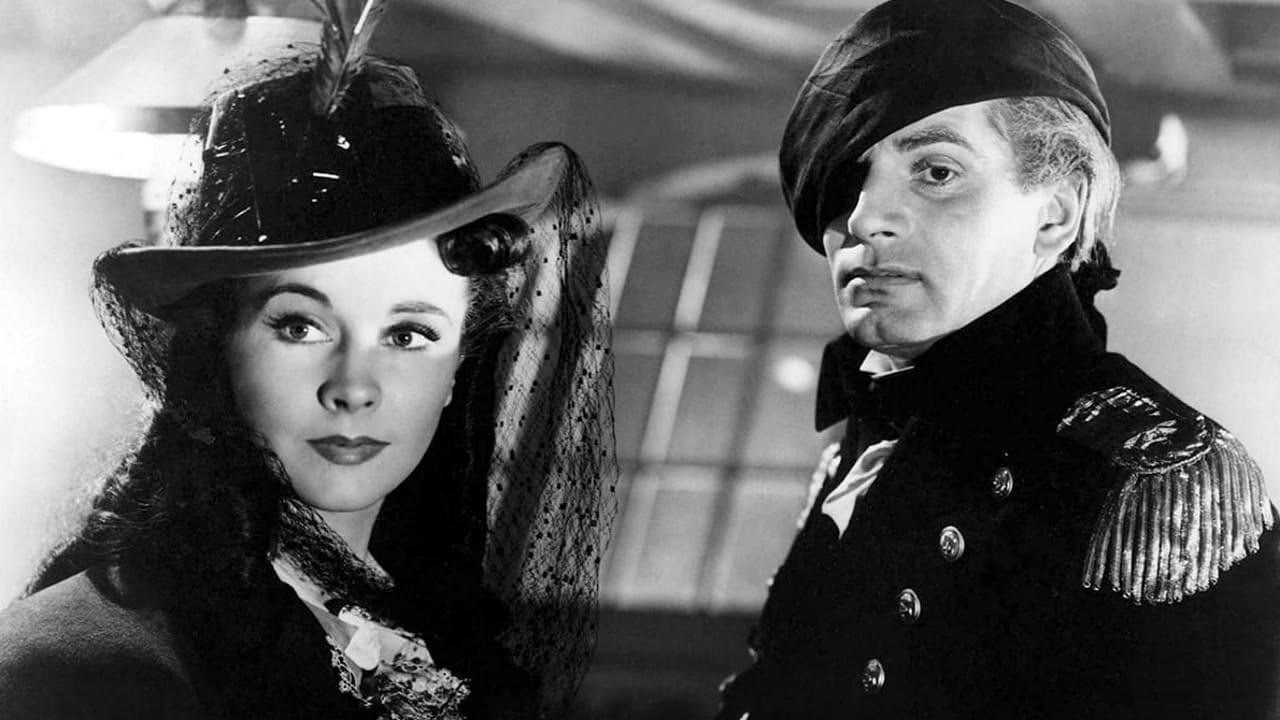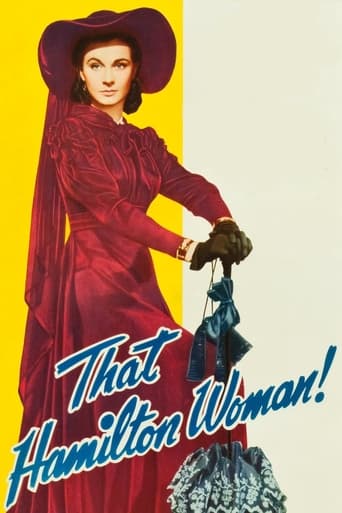

So many reasons for see it ! from the status of testimony about the spirit of a period to the performances - Vivien Leigh is magnificent as Emma Hilton - to the naval battle and the imposible love story. it is not a film for define it. and not an artistic delight. or a masterpiece. after its end, you discover it as a very personal message. sure, romanticism is present. and it could appear as the basic ingredient. but the film gives more than a sensitive story. but a kind of ...spell. about succes and sacrifice and fall. using the perfect couple.
... View More"That Hamilton Woman" is a dramatised version of the love story of Admiral Horatio Nelson and Emma Hamilton, the wife of the British ambassador to the Kingdom of Naples. Emma Hart (nee Amy Lyon) was a beautiful courtesan who became the mistress first of Sir Charles Greville and then of his uncle Sir William Hamilton, the British ambassador; it is said that Greville effectively "sold" Emma to Hamilton in exchange for assistance with his gambling debts. Despite this unromantic start to their relationship, the much older Sir William fell in love with the lovely young woman and married her. She, however, did not return his love, and when Nelson, then a dashing captain, visited Naples on official business she fell passionately in love with him. In this film the story, as the title might suggest, is told more from Emma's point of view than Nelson's. It opens in 1815, ten years after Nelson's death, with Emma, now ageing and impoverished, living in exile in France. She is arrested in Calais for a petty theft and while in prison tells her life story to a fellow inmate. The rest of the story is then shown in flashback. The film was a controversial one, particularly in the United States, when it first came out in 1941. There were two reasons for this. The first is that it violated the Production Code by showing an adulterous relationship as something romantic rather than something sinful. Emma is played as a romantic heroine rather than a wicked temptress, which is how the cinema of this period normally depicted adulteresses. Nelson's wife Frances is here played by Gladys Cooper as a jealous, vindictive and embittered harridan rather than as patient and long-suffering, which is how the cinema of this period normally depicted wronged wives (and how Lady Nelson seems to have been in real life). Emma is not only a romantic heroine but also a tragic one, a woman who gives her love to Britain's greatest hero but who after his death in battle is shabbily treated by an ungrateful nation and ends her days penniless in a foreign land- ironically, the land against whose forces her lover fought so gallantly. The second reason why the film was so controversial was that it was a quite blatant piece of propaganda. The Napoleonic Wars are seen from the British perspective, as a struggle against a ruthless and tyrannical dictator with ambitions to rule the whole of Europe. The parallels between Napoleon and Hitler are quite deliberate and are underlined by the Churchillian speeches given to Nelson. ("You cannot make peace with dictators. You have to destroy them–wipe them out!") Had the film been made in Britain, this sort of thing would have been par for the course in 1941, but it was actually made in America, albeit by the Hungarian- born Briton Alexander Korda, who acted as both producer and director, with a largely British cast. As America was not yet in the war, Korda was bitterly assailed as a warmongering propagandist by the influential isolationist movement, still blithely oblivious to the very real threat which the Axis Powers presented to their own country. According to one story Korda was summoned to appear before an angry Senate Foreign Relations Committee and was only excused attendance when the attack on Pearl Harbor took place a few days before his scheduled appointment. The two leading roles, Britain's Golden Couple of the 1790s, are played by Olivier and Vivien Leigh, Britain's Golden Couple of the 1940s, , then recently married. (This was the only one of their three films together made after their marriage). Leigh, if anything even more beautiful in 1941 than she had been in "Gone with the Wind" two years earlier, has all the glamour needed for her role, as well as the skill needed to make Emma a sympathetic figure, despite her ambiguous past, and Olivier makes Nelson suitably passionate and daring. There is also a good contribution from Alan Mowbray as Sir William, initially urbane and sophisticated but who later seems small-minded and mean-spirited, caring more for his collection of antique sculptures than for any human being, Emma included. The action scenes of the Battle of Trafalgar are surprisingly well done, given the limited special effects available to film-makers at this period. (Nelson's earlier victories at The Nile and Copenhagen, however, are not shown at all and mentioned only in passing; Korda evidently wanted to save the big show for the end). Seventy-five years on, we need no longer worry about the historical controversies which so exercised people when the film was first made. Today we can see it less as a piece of propaganda than as a fine costume drama. Certainly, it can seem a little melodramatic for modern tastes, but it is nevertheless an excellent example of the style of film-making that was in vogue during this period. 8/10
... View MoreThis picture emphasizes the fact that Vivien Leigh is not only beautiful but a major talent, too. In some ways, the character of Lady Emma Hamilton does resemble Leigh's earlier role of Scarlett O'Hara, but this is not surprising when one considers the actress is often typecast as the scheming vixen. In a particularly memorable scene, when the Lady argues with her husband (Alan Mowbray) you do get a sense of Scarlett quarreling with Rhett. But the actress' undeniable chemistry with costar Laurence Olivier, as lover Lord Nelson, is perfect and much more intimate than what she shared on screen with Clark Gable in Gone with the Wind.In fact, we believe that these two sincerely love each other. Both performers are rather eloquent and yet passionate in this film. And Korda's direction is superb. In addition to the great melodramatic moments, we are treated to some very realistic battle scenes that provide a fair amount of adventure amid the realities of war.
... View MoreThus says Vivian Leigh when asked "What happened then, what happened after". As she lies in prison, drunk and penniless, she describes to a fellow prisoner, her life as the beloved mistress of one of England's greatest heroes.This is a film that stays with you, not only for the story of the ill-fated romance of Admiral Lord Nelson and Lady Emma Hamilton, but also for the perfect casting of the leads, Vivian Leigh and Laurence Olivier. They were impossibly beautiful and besotted with each other in real life (they had just married). That attraction was obvious on the screen and reflected the love affair of the characters they portrayed.The story follows Lady Emma's life from a possession passed from nephew to uncle (Sir Edward Hamilton, well played by Alan Mowbray), to her marriage to Hamilton and her meeting with Horatio Nelson. From that point, it's time to bring out the hankies as the love affair, doomed from the beginning, moves to its inevitable conclusion. There is more than enough pathos to move the most jaded movie lover.One of my favorite scenes in the film is that in which Nelson returns to Naples against orders to rescue Emma and she collapses against him saying "I would have died if you would have left me here".The film may not be for all tastes, as it contains a plethora of propaganda aimed at the US which was still neutral in WWII, and does not portray the characters exactly as they may have been. But I say "Who cares"??? It's the kind of love story that will grab your heart and bring you back to watch it again and again.It seems impossible to find it on anything but tape......my copy is on BETA which goes to show how badly I want to have repeated viewings!!!!
... View More